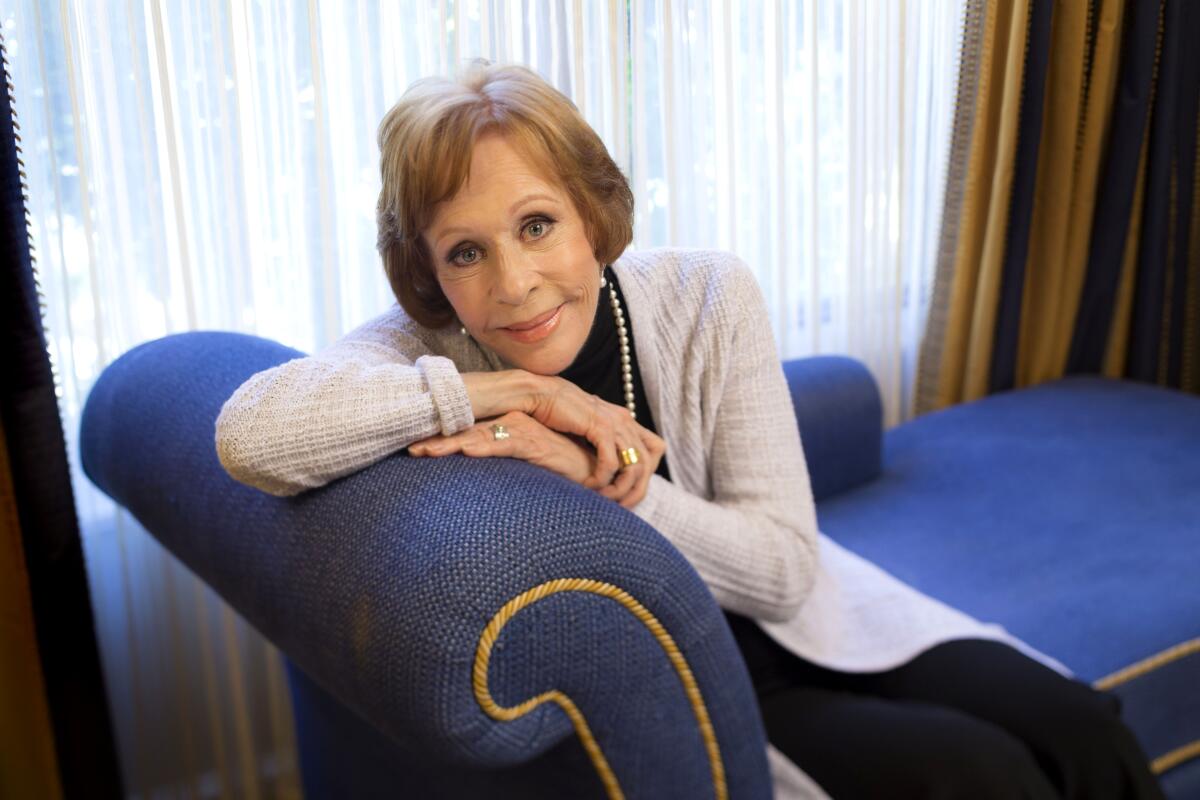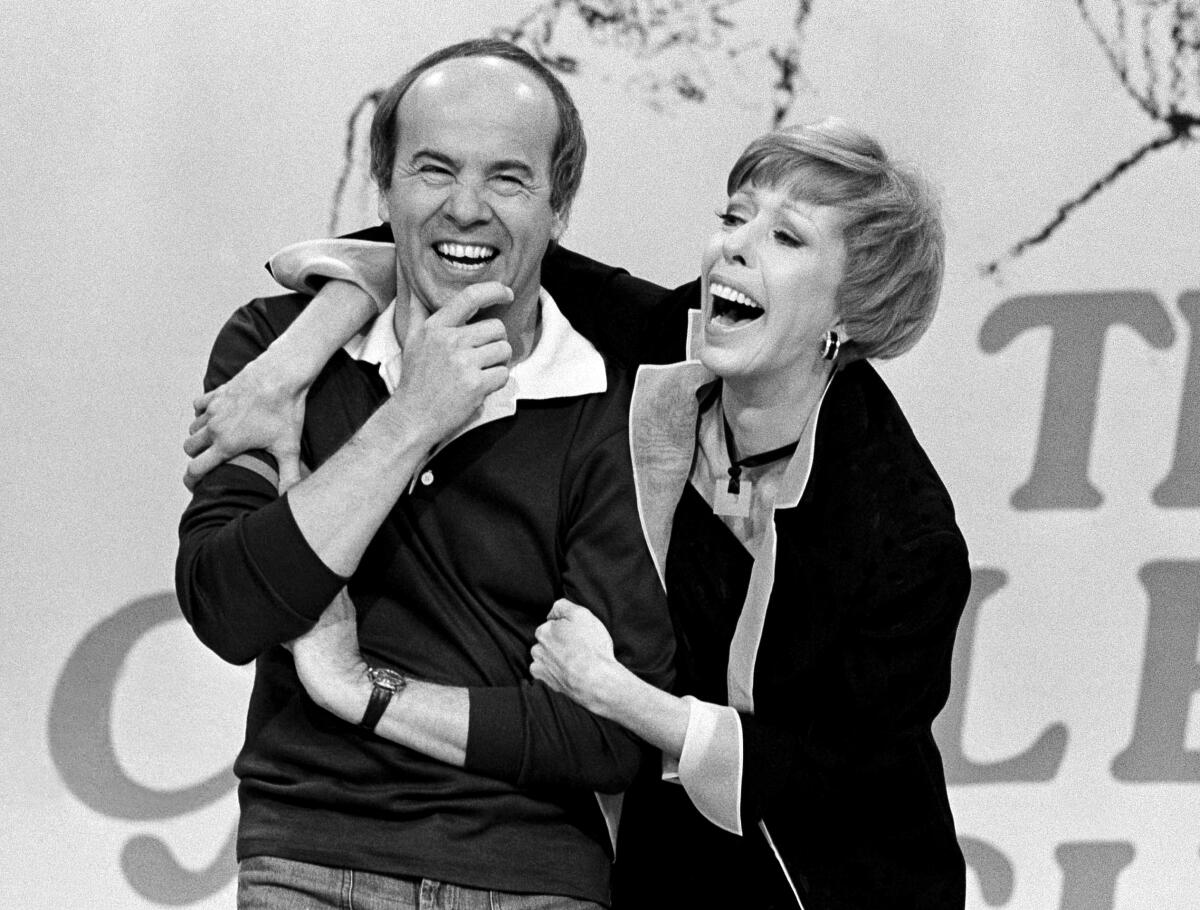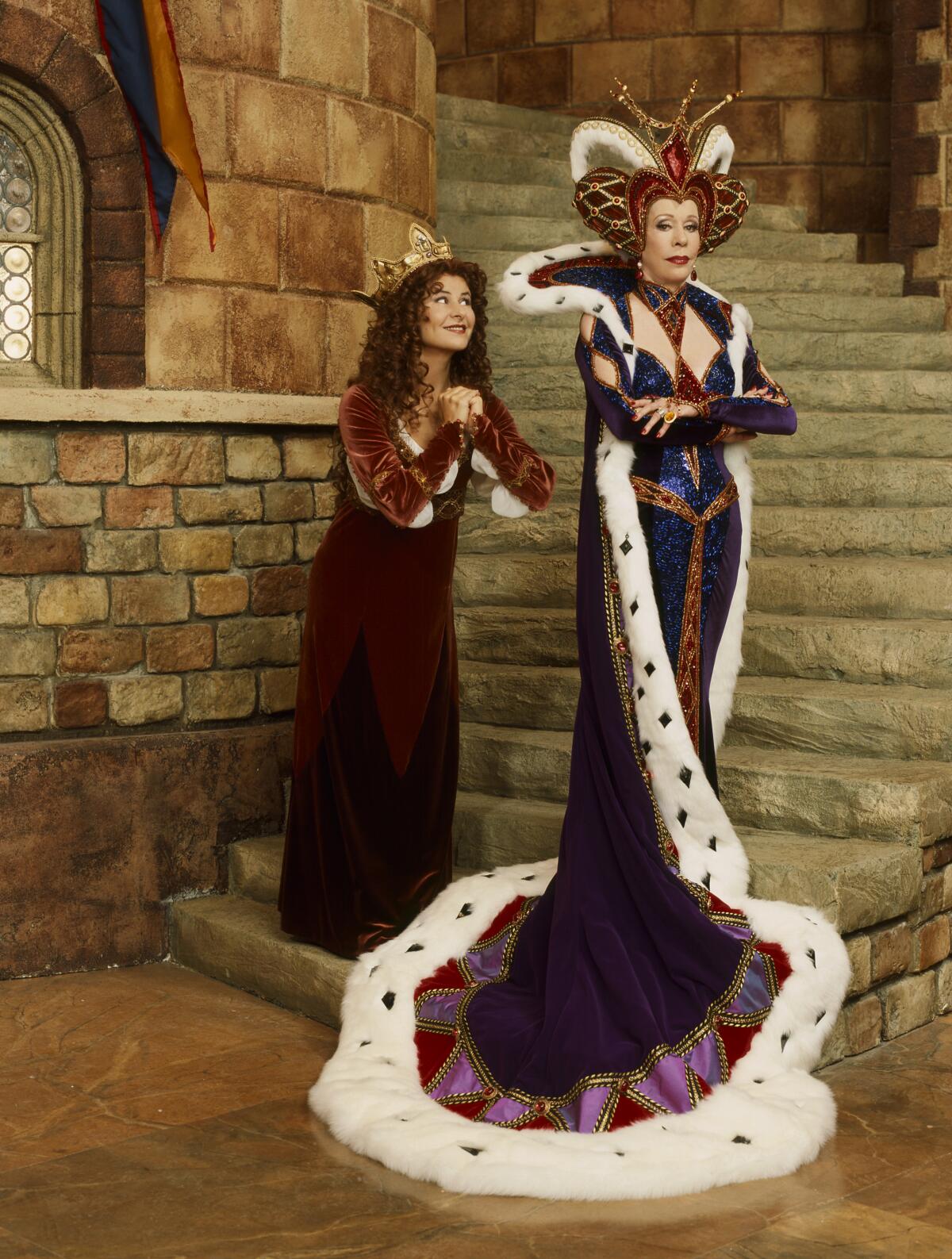Celebrating Carol Burnett at 90: She was built for comedy and for TV

- Share via
Carol Burnett turns 90 on Wednesday, and to mark the date, there’s a television special, “Carol Burnett: 90 Years of Laughter + Love” (on NBC — not her old home network, CBS — before moving to Peacock). It’s studded with stars, many of whom have professional or personal history with the guest of honor. Seated with best “chum” Julie Andrews, Burnett allows herself to be showered with the affection, spoken and sung, she’s always generated. The title is apt: Who merely likes Burnett? It’s love or nothing.
That Burnett means something to her fans on a personal level has something to do with her talent, of course, but it also has much to do with our perception of her as a good-hearted human — a feeling regularly expressed in the Q&A session that began each episode of “The Carol Burnett Show.”
The facts of her life are widely known. She’s written four memoirs; co-wrote a semi-autobiographical play, “Hollywood Arms,” with her late daughter, actor Carrie Hamilton; sat for many, many interviews, including a recent spate of 90th-birthday talk show visits; and been the subject of an “American Masters” documentary, an episode of “Finding Your Roots” and a Little Golden Book. It’s common knowledge that tugging her ear lobe began as a message to her grandmother. We know Carol on a first-name basis.
Carol Burnett marked her 90th birthday on Wednesday. Here’s a rundown of where to stream her films and TV shows.
Eleven seasons of “The Carol Burnett Show,” from 1967 to 1978, made Burnett family to more than one generation of television viewers, all the more as it was a show families watched together. It might be bawdy, but it was never blue; and though it could be cutting, even a little upsetting, as in the “Family” sketches in which the star played the much-abused Eunice, the show’s default mode was a genial, generous silliness. It had no interest in the news; its favorite targets — or subjects, rather, as the satire was affectionate — were the iconic Hollywood films Burnett grew up on. When television is finally laid to rest, we will still remember her sweeping down a staircase, in a dress made from drapes — and their rod — in a takeoff on “Gone With the Wind.”

Burnett’s career embodies a confluence of mediums. She grew up on the movies, in Hollywood, where with her grandmother she would see several a week and would then reenact them with playmates afterward. (Jump ahead to “The Carol Burnett Show.”) Wanting to break into the theater, she set off for New York — her trip sponsored by a benefactor whose identity she has always kept secret — at a time when the scene, on- and off-Broadway, was lively, the city was the center of television and TV was not so much a budget version of film as an electronic extension of the stage.
And it was a song — “I Made a Fool of Myself Over John Foster Dulles,” the secretary of State under then-President Eisenhower — performed in a nightclub act at the Blue Angel that led to appearances on “Tonight Starring Jack Paar” and “The Ed Sullivan Show,” and eventually, from 1959 to 1962, to a regular spot on “The Garry Moore Show.”
(Carl Reiner, when I interviewed him once about working for Sid Caesar in those years, remembered a young Burnett, who had a friend on “Caesar’s Hour,” coming to Saturday night run-throughs, then going home to see how the broadcast differed. “She was dedicated to learning her craft,” he said.)
By the time “The Carol Burnett Show” premiered, Burnett had already won three Emmys: one for “Moore”; one for her 1962 special with Julie Andrews, “Julie and Carol at Carnegie Hall” (with a script by Mike Nichols); and the 1963 “An Evening With Carol Burnett,” featuring Robert Preston. “Once Upon a Mattress,” which made her a Broadway star in 1959, was mounted for television in 1964 (she would play Princess Winnifred again for television in 1972, and the queen in 2005), following a 1963 broadcast of “Calamity Jane” (adapted from the Doris Day film). A 1966 special, “Carol + 2,” with Zero Mostel and Lucille Ball, followed.

Her series brought her back west, to “Television City in Hollywood.” CBS had wanted a situation comedy, but Burnett had the contractual power to demand a variety show, combining sketches and musical numbers. And yet its long-running, little-changing central cast — Burnett, Harvey Korman (main comic foil), Lyle Waggoner (announcer and random handsome guy), Vicki Lawrence (onscreen kid sister and onscreen mother) and Tim Conway (deadpan anarchist) — and recurring bits and characters gave the show something of the flavor of a sitcom: a family comedy composed of skits and songs. At the same time, it was a sort of theater; it mattered that it was live and imperfect. The bloopers stayed in, if they were funny, and became a signature of the show, which at times seemed like a war between cast members attempting not to break up and others determined to make it happen.
With an athletic gift for slapstick and a rubbery way of expressing herself — her speech a symphony of high-end squeaks and low-end syllables drawn out for effect that matched what she’d do with her mouth and eyes — Burnett was built for comedy and for television. Had she first pursued a career in pictures, she might well have joined that corps of talented women maddeningly fated to play the funny best friend. TV took her whole, allowed her to play characters old, young, smart, dumb, dignified and undignified; she could project sex appeal so well because she was herself appealing. And, just as important, TV let her sing.
After the CBS series closed shop, on the star’s initiative, there were other, briefer, variously titled iterations of “The Carol Burnett Show,” but variety had by that time become something more to remember fondly than invest in. Still, there were more specials to come, including a reunion with Andrews, “Julie and Carol at Lincoln Center,” “Dolly & Carol in Nashville,” as in Parton; “Sills and Burnett at the Met,” as in Beverly; television movies (and some theatrical features, including the musical “Annie” and Robert Altman’s “A Wedding”) that showed off her dramatic range. There were turns on “The Larry Sanders Show,” “Mad About You,” “Glee,” “All My Children” and, just last year, “Better Call Saul.” Upcoming: “Palm Royale” on Apple TV+, teased in the birthday special by costars Laura Dern, Kristen Wiig and Allison Janney.
“Love + Laughter” — they’re much the same thing. Burnett has often recalled the life-changing effect of the first laughs she got onstage; and nothing makes an audience happier and more grateful than to be made to laugh. It’s an exchange of gifts. Her closing theme, written by her then-husband and producer Joe Hamilton — “I’m so glad we had this time together/Just to have a laugh or sing a song” — has the ring of truth. Happily, it isn’t time we have to say so long.
‘Carol Burnett: 90 Years of Laughter + Love’
Where: NBC
When: 8 p.m. Wednesday
Streaming: Peacock (any time, starting Thursday)
Rating: TV-PG (may be unsuitable for young children)
More to Read
The complete guide to home viewing
Get Screen Gab for everything about the TV shows and streaming movies everyone’s talking about.
You may occasionally receive promotional content from the Los Angeles Times.








